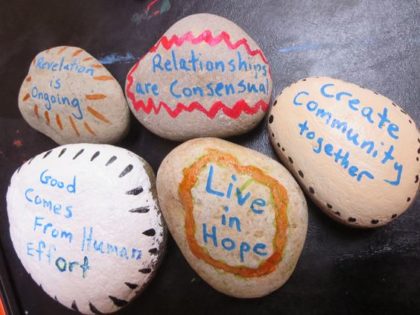
October 12, 2019 from Gabrielle
As we struggle through a Fall overflowing with news and change and enjoying once-and-again opportunities (a post-season Championship run comes to mind), Vi Hilbert, a highly respected Native American elder, named a national treasure by the Smithsonian, comes into focus.
Hilbert is an educator, and in a response to a comment about how learning has shifted, he says “…if you take a flower and make a flat statement to a child, ‘This is a flower,’ and leave it at that, this is a way of strangling perception; because in effect, it is saying that there is only one way of knowing a flower. What most education overlooks is the variety of ways in which the flower can be perceived. A lot of teachers complain about lack of time or too much testing or too many set standards, and indeed what Hilbert offers is more difficult, often radically difficult. And yet, yif ou want to know what a flower is, you must examine it from a multitude of levels, from smell and taste and touch and hearing, from personifying and fantasizing; and all of these can coexist, and one is no more important than the other. ”
As Unitarian Universalists, we are fortunate that we recognized the truth of Hilbert’s learning philosophy (and John Dewey’s) and how it aligned with our theology. We collectively set about designing curriculum that draws out from children what they already know and companions it with what is new about the world. We are also lucky that we do this in the context of a lifespan of a child…birth until they take leave of us and the end of their formal schooling. With hopes of returning.
What your child needs to make this learning take hold, however, is what Vi Hilbert recommends “Practice, Practice. Practice listening intensely, integrating information that you are going to be told many, many times. Each time you will retain another piece of the information. By the time you have done your listening many times, if you don’t turn off your mind, you will have the whole picture.“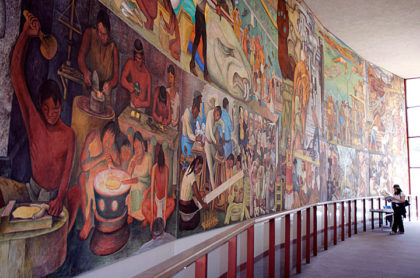
“The whole picture” is, indeed, what can be discovered here. This Sunday time together allows opportunities to examine what a flower teaches us – in it we can see kindness, forgiveness, love, loss and re-creation. But it takes that practice, that commitment to be here, a commitment to engage, to connect to one another, a commitment to the endeavor. And it seems harder than ever to make.
To that end, 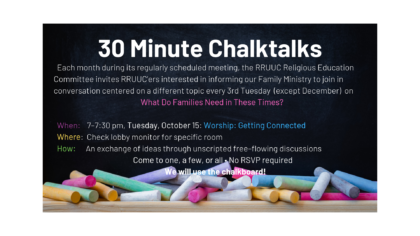 the RE Committee is inviting families who want to drop in once a month to inform what we do…to share what would make a difference in your family…to hear your hopes and dreams for that whole picture being opened for your child, on any 3rd Tuesday night at 7:00pm for 30 Minute Chalk Talks. We would love to see and hear from you.
the RE Committee is inviting families who want to drop in once a month to inform what we do…to share what would make a difference in your family…to hear your hopes and dreams for that whole picture being opened for your child, on any 3rd Tuesday night at 7:00pm for 30 Minute Chalk Talks. We would love to see and hear from you.
October 1, 2019 from Beth
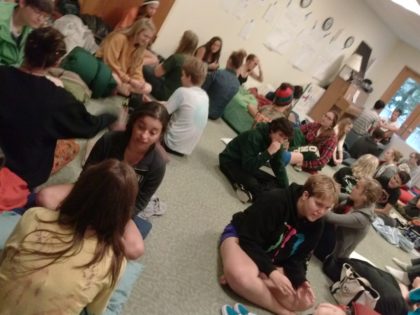 Before classes began, I gave teachers and advisors this list of “Five Questions Every Teacher Should Know About Their Students” by Reggie Joiner, adapted by Tim Atkins.
Before classes began, I gave teachers and advisors this list of “Five Questions Every Teacher Should Know About Their Students” by Reggie Joiner, adapted by Tim Atkins.
- Do you know my name?
- Do you know what matters to me?
- Do you know where I live? Not literally, but what is your family like and who’s part of your world.
- Do you know what I’ve done?
- Do you know what I can do?
The volunteer teachers and advisors often operate in this very relational way with the students already. It’s a reminder that getting to know their students and developing a great relationship is their first priority, more than a curriculum or set of activities.
I’ve heard and agree that kids need at least 5 adults in their lives who aren’t their parents.
https://theparentcue.org/why-your-kids-need-five-other-adults-in-their-lives/
Especially, as they move into middle and high school, kids are sometimes reluctant to talk to their parents (totally developmentally normal!) So, it’s really great if they can connect to some adults here at River Road. They probably won’t click with all of their teachers in a given year, but maybe one or two along the way.
All of this only happens if your child shows up. If you come every Sunday, that’s still around 4 hours a month to develop these relationships. Not much in the big picture of their whole life! Yet, it adds up. As UUs, we don’t require attendance (except OWL class,) but, like most good things in life, you get out of it what you put into it.
Hope to see you all this Sunday!
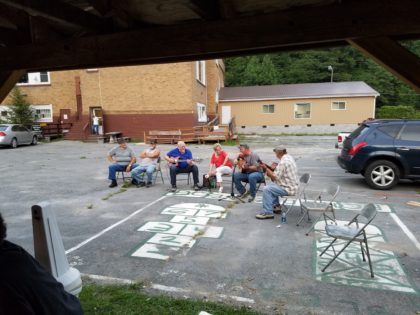 September 27, 2019
September 27, 2019
In between scheduling teachers for the next 40 Sundays….I work on lessons for you got it, December and January and beyond. As is my practice, I look to the human story somewhere in our Unitarian Universalist Wisdom Sources to inform me in what direction we shall go. These stories, which lay around us like unseen jewels, (hopefully) help parents grow loving and empathetic and brave people.
Today, I work on December and how we may share the story of Hanukkah without tokenizing it against the omnipresent Christmas ones. It is a complicated story of military victory throwing off of foreign rule, a rededication of the Jewish Temple, and terrible violence.
For us as Unitarian Universalists, what might be most important is understanding that this story happens over and over. To give a terribly brief summary: King Antiochus, having received the land of Judea after Alexander the Great’s death, wanted the Jewish people to believe in the Greek gods and adopt Greek culture. Some people did while others who resisted were killed. The oil in the lamps was added much later.
One of the first questions we ask after its telling is, “Where are the King Antiochus’ today?” At this moment in time, the world seems replete with them.
But even though the stories of King Antiochus abound, so too does the story of Mattityahu who, stood up (alongside many others who go nameless) and said, “No more.” Mattityahu is also Martin Luther King, Jr. and Ghandi, also Frances Harper and Susan B. Anthony, the Parkland kids, Malala, and Greta Thurnberg.
I am reminded that at RRUUC we have many, many Mattiityahus —folks who work for freedom and justice. Their lives will not become stories that are told centuries later, but in the small, daily places that define a life — they do god’s/good work too.
So too, are there children and youth at RRUUC, who clean natural spaces, make lunches for Bethesda Cares, attend Climate Change rallies, write letters to the President, or hold a bakesale to raise money for an animal shelter that does not euthanize, travel to West Virgina for a week to help build a community, or put on the annual January Murder Mystery fun-raiser” to raise money an organization who calls out “no more.”
The four letters on the dreidal, Nun, Gimmel, Hay and Shin, stand for the saying, “A great miracle happened here.” This is what we are doing every Sunday at River Road – reminding our children and youth to be that great miracle.
It is this simple. It is that important. See you on Sunday!
Gabrielle
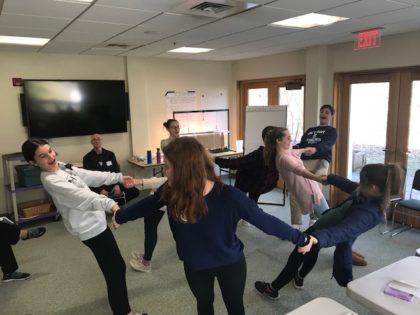
September 20, 2019
There is a YouTube video http://www.youtube.com/watch?v=QX_oy9614HQ titled the Marshmallow Experiment that I watch every now and again when I want to see the whole-of-the-world in 3.25 minutes. The point of the experiment is to test self-control and how evidence of such in 4 year-olds may predict later success (it has since been proven that it doesn’t so go ahead and do this at home.)
For me though, the video is an opportunity to see the past, present and future embodied in young children. It’s all there, gloriously out loud.
As each child is introduced to the choice of receiving two marshmallows if they wait OR eating the one in front of them RIGHT NOW, their memories of its taste are evidenced by their “smells yummy” responses, smiles, and apprehensive “can-I-do-this” grimaces. I sometimes slow the introduction allowing me to witness what delicious remembering looks like.
The future is visible too – and their faith in it and the promises adults make about it – first that the adult will return and secondly, that when she does, she will bring another marshmallow.
And then there is the present – the video could be the visual definition of what being present looks like. Every moment of their waiting is filled with that marshmallow. The children’s eyes bore into that white cube on a plate, their hands caress it, their heads bow or turn to the side so as not to see it, they dance in their seats, all the while remaining fully present to that marshmallow.
Sign up to teach here and that worrisome feeling that you are over committed, will disappear because being present for one hour will sustain you through all the rest.
Gabrielle
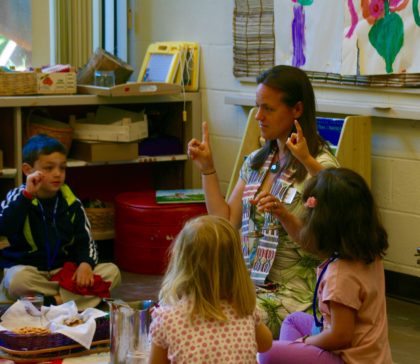 September 13, 2019
September 13, 2019
My wish on all of my First Day of RE is everyone returns and that I once again indulge a privilege of serving….to see how children grow. It is a sustaining witness and we are at the moment again.
This witness is not only available to me, though admittedly my view may be larger than most. It’s also available to each of you. It is another benefit of being part of the teaching ministry of a lifelong multi-generational community. It keeps us close to the natural rhythms of life and the space we occupy between our first view and our last. And this view, if we cultivate it, if we abide it, can order our lives into a more grounding peace and meaning.
But as with most things that matter, it doesn’t come cheap….it requires some skin, maybe some skinned knees and so most people don’t naturally gravitate towards it. In fact, maybe a lot us look away. Some of that is because we say to ourselves, “who me? I don’t know anything about this and it waaaaaaaay out of my comfort zone.”
We talked about this at our last RE Committee meeting…why people say yes to teaching and what each of the folks around the table, whose knees may be a bit scarred AND whose hearts are deeper and minds are fuller by virtue of their commitment to being part of a teaching ministry to children and youth, needed.
One RE Committee member shared this:
When I lived in Hawaii, as a young, single mom, I signed my then 6-year-old up for county soccer. Just as the season was about to start, I received a phone call. The person on the other end said, “The great news is, we have a team for your daughter!”…. ” the other part of the news…. you’ll have to coach it to make it a go.”
It wasn’t a call I wanted to get or a decision I wanted to make. But…
With only one year of soccer playing experience when I was in 5th grade, coached by my dad under my belt… I said yes. I’ve never been a sports person, and even when I played, the rules and skills eluded me.
However my daughter wanted to play, and so did other children, and frankly, I could say yes to this so I ran to the nearest bookstore to find ANYTHING about soccer and drills etc, for kids and made a plan.
Was I uncomfortable? Yes (terrified, actually).
Out of my element? Yes.
But I did it…. and it was fine.
Perfect? Nah.
But the kids were happy to play and me, I learned again that I could do things with some help, including helping build a community for my daughter which is really why I said yes.”
Do you have a yes in you? If you do, send me an email here.
We have six (6) teaching openings left….
You don’t even have to go to a bookstore…we have you covered.
Gabrielle
August 6
I am sure you are as tired of reading these types of articles as I am, but tending to this parenting “task” with some measure of confidence, is important for children of all ages (and ourselves) and sometimes we forget how. In the wake of yet another tragic series of shootings, I offer this from the Screenager’s blog….How to Talk to Your Kids about Scary and Tragic Things and When Bad Things Happen from Teaching Tolerance and/or Faithful from the UUA’s Braver/Wiser blog.
I agree with it’s basic premise…that dedicating time to check in and create a space for airing feelings of insecurity or fear is what is most important. I even agree that many children, particularly middle class white children are more safe than not…but not all are and I want to live in a nation dedicated to keeping ALL children safe.
In addition to creating a family space to air feelings of fear, inviting your children act in some way that may alleviate whatever issue they identify…writing letters, joining a Gun Violence group, or  making cookies for the adults and teenagers working to end gun violence…can build confidence and comfort in being able to change the situation.
making cookies for the adults and teenagers working to end gun violence…can build confidence and comfort in being able to change the situation.
And though many of us, have at times given in to thinking this is all something we cannot change…that is false.
This is something we can change.
It is possible.
Let’s get to it.
Gabrielle
July 31
I write on the second to last morning before we return from a three-week vacation in Maine. I’ve never been “on vacation” for this long. Our Maine rental, though surrounded by many insects, afforded a peaceful and still view 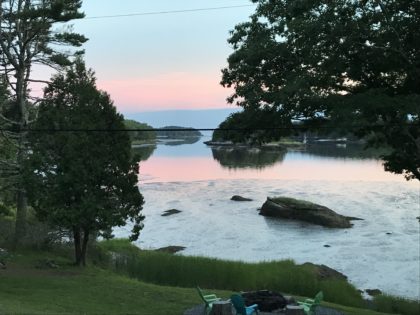 that on a sunny day gleamed and at night reflected the stars. The accompanying breeze provided lots of opportunities for sweaters.
that on a sunny day gleamed and at night reflected the stars. The accompanying breeze provided lots of opportunities for sweaters.
My sabbatical time has been full. There was a lot more family time which is often shorted during the congregational year because of its rhythms. I helped my mother move to senior independent living including putting her condo up for sale. At the same time, my daughter, her husband and my granddaughter moved home literally. To ready our home for three (3) more people living in it short-term, we moved “stuff” to storage realizing all the while that two adults and two dogs shouldn’t have so much in the first place. Both are busy finishing up job prospects while our granddaughter delights us with the “drop” phase – dropping things from the high chair, car seat, and into the airplane aisle —and even sometimes herself.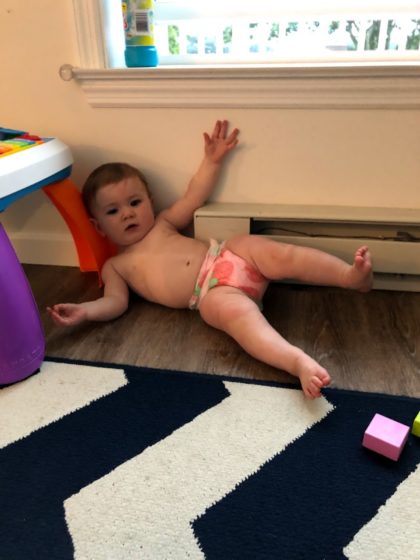 To punctuate the middle of this and that, we had a family reunion in the good city of Baltimore.
To punctuate the middle of this and that, we had a family reunion in the good city of Baltimore.
There wasn’t as much reading as planned, but lots of writing of lessons and stories for the coming year. I’ve planned for a solid line-up of possible Adult RE offerings (read about them soon!) and my voluminous web resources for religious education and anti-racist and anti-oppression are almost organized enough to be useable. I also mapped out a website for curriculum offerings developed at RRUUC which, along with the website creation class I took before leaving on sabbatical, will help spread our RRUUC vision further.
There was a lot of empty time, especially early on. My dad used to just sit and look out the window and in my young adult life I couldn’t imagine why, while in my middle age life, I was I couldn’t imagine how. My at-home-window sights are compelling, calling me into peace and stillness at least until the dog barks.
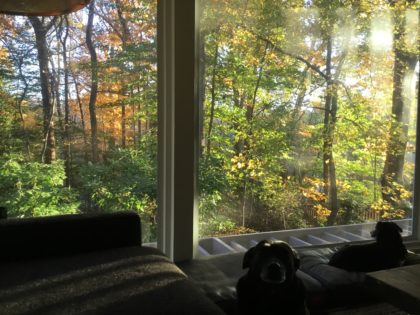
I indulged it…and it helped deepen an inner peace while the country and the world challenged it. It restored my strength to continue the work, but at a notch higher and harder for tikkun olam, “repair of the world.”
Each day….I said a grateful word…for all of you, colleagues and congregants, and hope that occasionally, on a breeze here or there, you may have “heard” it. I look forward to seeing you all next week….
love, Gabrielle
April 11 from Gabrielle
There are two underlying stories to my ministry to families and children…..one is the story of the birth of Jesus – the Christmas story. If I were more familiar with birth stories from other traditions, I’m sure I would hold them close too. 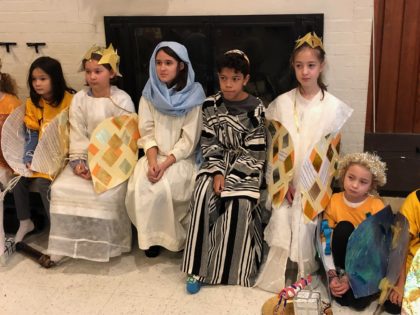
The other is a book written by educator Vivian Gussin Paley titled You Can’t Say You Can’t Play, a philosophical statement of radical inclusion for adults and children alike …in other words — how to treat everyone after we are born.
The book, a thin volume filled with conversations between Paley and the children in the private school where she taught, articulates the hopes and doubts about whether this expectation is really possible.
What is most startling about her attempt is how all children wished the rule would work, but few children think it can. All are certain it is hard to do even if it is possible. Their experience is remarkably similar to the social justice and transformative efforts, we as religious peoples everywhere, experience in building beloved community.
You might be thinking to yourself, “What a strange, pre-sabbatical message for Gabrielle to write as she spends some time away studying and playing in the world?” Perhaps…but it is precisely this that I will be centering myself to – how can I, in my private life, learn different behaviors and to what, in my professional life, do I need to offer to give children more hope that all can be included.
Right now…the temptation to look away is waaaay strong….some days you have to just to get thru it. Prayer is good as is the outdoors and having nonsense fun and playing hard and experiencing breathtaking beauty. Rituals that give shape to your day help too. What else?
Despite the challenge, trying to create a world in which all are included, in which all play together, is what congregational life is about. And while I am away from it, its possibility will not be far away from my heart and mind….
While I am gone, I hope you play and seek beauty, I hope you consider how to be more fair and include difference in your life, especially when it’s hard. I hope you hug your family members just a bit longer and I hope you take some opportunities to sing loud and walk in the rain if that’s the only way to get wet outside. I hope you come to RRUUC and play with art or garden with children.
You see, I think it’s simpler to be together than we all think.
See you in August!
April 5 – Beth
Sacred Moments
One of my favorite yoga instructors put the question to the class “how do you define sacred?” For me, it means connection. Connection to others, connection to the natural world, connection to myself, connection to the universe. All of these connections happen with silence. I stop running around, being busy, distracting myself with podcasts or news. They are moments of simply being.
On a trip to the Grand Canyon years ago, my family and I went to a ranger talk on the full moon. As the group gathered on an outcropping waiting for the ranger, we watched the sun set on one side of the canyon while at the same time the full moon rose above the other side. There was a collective gasp as the moon cleared the edge of the canyon. It was magical to see and magical to experience with a group of fellow humans.
Last Tuesday in yoga class, we were packed in mat to mat. During the final savasana, the HVAC unit turned off and it was completely silent, which is unusual in the studio’s suburban setting. All I could hear was the quiet breath of my fellow yogis. I felt profoundly connected to that little piece of humanity and could imagine connecting to the larger world.
What does sacred mean to you? How can you cultivate or at least notice more sacred moments? My best advice is to find moments of stillness, moments of quiet, moments of connection. Turn down the volume on your life for a bit. “Be” rather than “Do.”
March 27 — from Gabrielle (edited from an earlier column)
Fortunately, one day Ned got a letter that said, ‘Please come to a Surprise Party’.
But unfortunately, the party was in Florida and he was in New York.
Fortunately he got on an airplane immediately.
Unfortunately the motor sputtered a bit.
Fortunately there was a parachute in the airplane.
Unfortunately there was a hole in the parachute.
Fortunately there was a haystack on the ground.
Unfortunately there was a pitchfork in the haystack.
So begins one of my favorite children’s books titled Fortunately by Remy Charlip published in 1964. My life is full of pitchforks and sputtering motors, but it is also full of parachutes and invitations. This 2019, my life has seemed to have a few more holes and thinner haystacks, I count on the haystacks all the same.
I love this story because it is a wonderful parable about life, about congregational life, about children (our invitations) and teachers (our haystacks). We are full of children here at RRUUC, and so there is always a need, thank God, for adults to mentor and teach and guide and lead and advise to them the vitality of a free faith, to how to heal a broken world, and how to grow up strong and resilient.
Fortunately we have many children and youth.
Fortunately, our space is child/youth-friendly and inviting.
Fortunately, our learning is child/youth-centered and well-supported.
Most fortunately, children/youth keep RRUUC focused on the future.
Fortunately we have hundreds of adults from which to choose.
Unfortunately, sometimes when you tell people that they wait for one of the other hundreds to say yes!
Fortunately, 80 people will say yes!
Take note of the story’s title. Although there are more experiences with haystacks and pitchforks, the story concludes, as I have faith our story here will, with “Fortunately, there was a surprise party going on.”
Come, you are invited too. Be a teacher.
See you at RRUUC!
March 21 – Beth
Worms everywhere. Snows that don’t stick. Crocuses.
One of the sources for Unitarian Universalism is “Spiritual teachings of Earth-centered traditions which celebrate the sacred circle of life and instruct us to live in harmony with the rhythms of life.” Yet, many of us continually disconnect from the natural world, especially in this age of tech and busy-ness.
This past Wednesday was the spring equinox when we have approximately equal daylight and darkness. In Pagan traditions, it’s celebrated as a major turning point in the year, called Ostara. Celebrating can be as simple as noticing. Go outside. What’s different? What are you looking forward to as we have more daylight hours?
Plant some seeds. Let the warmer days encourage them to sprout. What seeds would you like to plant in your family? Either literal or metaphorical. What tradition can you start now that might bloom in the summer?
I encourage you to take some time to go outside and just Be. With all the awful things in the world, springtime can be a balm for the soul.
Sing! Joy! Spring! by the Manhattan Transfer
March 16 from Gabrielle
I have not recovered yet from the news in New Zealand. I have not recovered either from the void in compassion from those who represent the United States in the world. I cannot say the sorrow is equal but the latter compounds the first act. We are left with the written words from a mayor of South Bend, Indiana to comfort those who pray the same way in our own country.
We count those who say the Muslim prayers among us. And even if we didn’t, we need to claim that they are one with us or we are one with them…as we did in the aftermath of the Pittsburgh and Charleston shootings. Muslim, Jew, Baptist…nothing separates us but house of worship. Everything holds us all in the same circle.
So be kinder this week, to yourself too. Read the Mayor’s letter to your children. Better yet for those of reading age, invite them to read the letter, taking turns before dinner. Read this short but powerful post from my colleague the Rev. Erika Hewitt on prayer and how it can embrace us in times like this but in regular time as well.
Then sit. And let the sorrow wash over and around you. Say the words you need to say. My words today are…we are one.
 Amen. Ashe. Blessed Be. So Be It.
Amen. Ashe. Blessed Be. So Be It.
March 8 — Gabrielle (adapted from a column printed in 2012)
Prior to serving River Road, I served two historic congregations, both founded in the early 1800’s within fifteen years of each other, by legacy Unitarians if such exist, members of the Cranch/Eliot family. The congregations were separated by1000 miles, the oldest in Washington, DC and the second in St.Louis.
I learned well to serve in the context of legacy. “That which is handed down” is what Merriam Dictionary reads, giving us a framework with which to interpret what our Jewish brothers and sisters refer to as tikkun olam– repair of the world. Working with a legacy mindfulness calls to us to re-create what others have carried forward or transform as need demands.
In some ways, I work here as if my departure is imminent. And truth be told — those who know me well, can attest that I live every day with this same mindset. Contrary to what others might assume, I consider it a blessing.
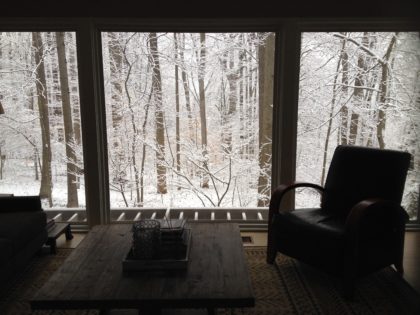
Can that which I did today continue — is a question that concludes my day, almost every day. Have I helped my grand-daughter grow strong and independent but also be vulnerable enough as relationship demands? Will the home I live in be as good to the next family as it has been to mine? When I wash the trash – as my mother-in-law was fond of describing recycling efforts ‑ am I helping those I will never live to see? The questions tumble out once you change your lens.
How might the frame of legacy change how you live?
March 1 – Beth
Growing up, as many of you experienced it, Lent was a time of giving something up. For me, it evolved into choosing something to do to grow spiritually. A few years ago, I started doing this Photo a Day practice, started by Mr Barb Greve, Karen Bellavance-Grace, and Alex Kapitan. I encourage you to try it. Share the photos with your family. Talk about it. See where it takes you.
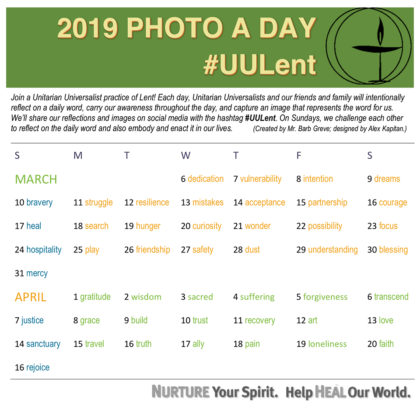
February 14 from Gabrielle
Sally Jenkins, a Washington Post sports columnist at the time, once referenced a quote by Jane Smiley that went “A love story, at least a convincing one, requires three elements: the lover, the beloved, and the adventures they have together.” At the time I savored the quote thinking of its truth in relation to my husband and child, my parents and brother too. I now can add, grandchild and son-in-law, my new in-laws and old ones, a passel of nieces and nephews that I adore, and friends and colleagues, that I have now shared more life with than I have with my brother alone.
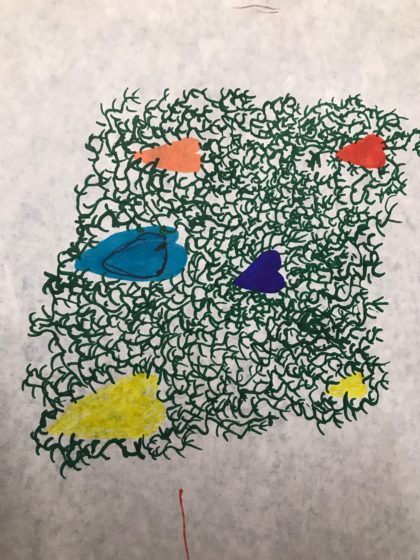
As I begin in earnest planning my four-month sabbatical, I reflect on the time we, here at RRUUC, have spent together.
It has been a whirlwind six years, the time flying past too quickly and too full. The changes we have made together have been remarkable — Spirit Play, Sacred Spaces workshop rotation, more small group and adult religious education opportunities, worship that features children and youth leaders ALOT, racial justice that calls each of us to possible uncomfortable and true places but with others with whom to be brave. I came to a place with excellent bones, made stronger by religious education colleagues such as Ginger Luke and Beth Irikura, but so too by a deep commitment and elbow grease on the part of the congregation to excellence in religious education.
This past year, my inaugural Kindergarten class crossed the bridge to sixth grade, and I miss them all every Sunday. Fortunately, the nursery is full, the Preschool busting thru the doors and the ones who mostly companion me on Sundays, celebrate and challenge every time we meet. And I fall in love all over again.
It hasn’t always been easy or rosy — but I came to the work here knowing not to expect that. In fact, when some moments were difficult, I knew that they were necessary — after all, as Jane Smiley reminds us “if [we] have no adventures, then [our] love is too easy, and [we] have no way of learning anything important about…one another.”
To be a congregation is to teach and preach love and justice out in the world. To become that congregation for each other is what we are about as well. Every Sunday, we come to practice…love. How lucky we are.
Gabrielle
February 7 – Beth
“I’m bored” said every kid ever, right? Maybe not so much anymore. With all of the electronic distractions and over-scheduled lives, is there still much chance of boredom?
This opinion piece in the New York Times, Let Children Get Bored Again by Pamela Paul makes the point that it’s actually good for us to be bored. Well, maybe she said children, but I’m going to include us adults as well. Has there been a time in recent memory when your whole family was bored and no one had an electronic in front of them? It hasn’t happened in my house in forever.
Yet, it is from a place of boredom that so much creativity can flow. I remember a Middle School class late night. There was an activity planned, but the teachers, feeling the kids were weary of planned activities, let them just play. It took them awhile to figure out what to do and how to navigate all the rules and relationships. It’s not a skill that they have a lot of practice with. In the end, they had a great time and got to know each other better than if they’d followed the plan.
One option is a screen-free day, weekend, or even a few hours together as a family. Bring out those books you’ve been meaning to read. Share a game. Or, make one up together. Give it a try and let me know how it went!
February 1 Guest Blog from Screenagers & Tech Talk Tuesday (for all ages)
HOW TO INCREASE MATURITY IN YOUTH
Some of the best moments as parents come from exposing our kids to the wonders of the world — starting from the warmth of human skin, to the soft cotton of a dry blanket, to the thrills of watching a garbage truck drive by, to the workings of a musical instrument, to the fun of a soccer ball. The list goes on. It is such an honor and privilege, and I fully believe our job, to introduce our children to all sorts of things, people, and experiences while they are growing up.
My childhood was filled with many experiences where my parents brought me to places where I was the only kid in the crowd. I grew a lot from such experiences. My dad brought me to poetry readings, cafes to play chess with adults, and to the horse races. My mom loved international dance classes and, starting at 5 years old, I would sit on the sidelines while she danced. Pretty soon it was clear I was not a good sitter and started joining in. By age 6, I would perform alongside the adults in their little shows. I remember the pride I felt when I had a solo at a small restaurant. More importantly, having the warmth and support of all the women in the class week after week was a healing force in my very chaotic childhood.
My kids have also often been the only young people in an audience and they tell me how grateful they are for these exposures – even though at times I know they felt a bit self-conscious. Here is an example. Some years ago, Simon Sinek was coming to speak in Seattle about leadership and I took my teens. It was actually my son’s birthday but he had seen Simon’s TED Talk and wanted to go. During the Q & A, I asked Simon his views on how hours of video gaming could be impacting leadership skills in our youth. His answer was so fascinating that later I asked if he would be in the film I was working on (Screenagers) and he enthusiastically agreed to do so.
There are many other examples of places I have taken my kids where they were nearly the only youth in the audience—talks given by congresspeople, rallies, improv shows at small theaters, temples, churches, art shows, lectures about science, and the list goes on.
When we involve young people in more adult-focused activities, we are showing them that we value and respect their insights. We want to hear their reaction to important issues. We are also conveying that we know they have creative and leadership qualities and want to give them examples of ways they might employ such traits as adults. This is a quote I love from my father-in-law, Parker Small, and it is related to what I am talking about, “We don’t mature in preparation for responsibility, we mature as a result of it.“
My kids are not always excited to go, but with some compromises on my part—like promising they get to choose other things to do together that day or how we can leave early if need be— they generally agree. We certainly have had our duds, and then I sheepishly whisper that we can leave at intermission. But more often than not, we get something out of these experiences—in part because I do homework before presenting my suggestions. I search online for speakers’ short videos to ensure they will be engaging.
With free time often equalling screen time (for both kids and adults), how do we ensure we take the time to expose our kids to real life people of different backgrounds, to people doing different careers, people creating art, and people working to improve the world?
How can we ensure all those in-person encounters actually happen?
1. Since it is still January—the New Year—now is a great time to put some activities on the calendar for the upcoming months to ensure they happen (and not get passed over by the convenience of yet another Netflix movie). Is there a dance performance or recital in your area? Is a speaker coming to town?
2. Talk with other parents to plan an event. My friend gets people to donate $5 to $10 a week, and they have a yoga teacher come to a house and lead some adults and teens through a class. Maybe have a few parents organize food making at someone’s home with the kids—perhaps apple pie making, simple sushi, or wontons (something hands on is great fun and lots of conversations happen between the adults and kids). Or, plan to see a talk altogether.
3. Give kids a say in things. For example, you want to take them to a museum, but they moan and groan. Tell them that if they want to leave after 20 minutes, you will be perfectly fine with that decision—and if they want to stay that will be even better!
By Delaney Ruston
January 27 from Gabrielle
Almost the first thing he uttered upon entering the preschool room (in another congregation I served), after making a beeline to the toy section, is “where’s the plane?” At first I didn’t understand him. I scanned the room and there was no plane and though I wasn’t in that room all that often, I did care for it enough and couldn’t recall to what he might be referring.
I was also a bit perplexed because this particular young child, only 3 years old at the time, was fairly new to that preschool space and hadn’t been attending for that long or that regularly as illness and naps got in the way.
I leaned down to tell him that not all “preschools” had toys planes in them, assuming he had mixed us up with another place. He found something else to engage him and he was off.
As I moved to other rooms that morning, I remembered that I had a Whole Foods shopping bag in my office full of toys I had brought home a month ago, to scrub away the accumulated fingerprints of years of use. I hadn’t managed to get them out of the bag and back to the room yet.
And yes, there was indeed a Fisher Price toy plane in there.
“Wow,” I thought, “what connected him to that plane and to this congregation?”
Sometimes in religious education circles we can wrestle a lot with “curriculum” when a Fisher Price toy plane might do. The thing of it is, connecting children (and their parents) to the congregation is what has to happen first, and then…..
And, so too, does the congregation’s curriculum make a difference — what we choose to engage our selves in hearing about, playing and wrestling with and integrating into our worldview. That’s why the RE Committee is holding a series of Tea & Transformation Brunches for families (offered by the age of your children). This endeavor is a partnership with the Families4Pathways to Racial Justice group so as to hear and share what is important about your child’s developing racial identity and learning. We also make sure that there are “planes” for your children to connect tangibly with too.
There is always something – the music, the radical hospitality, the preaching, the toys, the woods and yes, what we choose to “teach.” That particular something, over time, changes and becomes wider, bigger, integral, more loving and sustaining.
To make the connection – to find that sustaining love – one has to be here. As one of my favorite Buddhist wisdoms remind, “the teacher arrives when the student is ready.” That young boy was waaaaaay ready.
January 18 from Beth
Why do the youth present a murder mystery dinner theater every year?
In youth ministry and my religious education philosophy, the process is more important than the product. Although, in this case, the product is pretty great too. The murder mystery offers a big collaborative project, supports great organizations, and fellowship for the congregation.
In the fall, the youth bounce around ideas for a theme for the play. We invite Suzyn Smith Webb in to gather their ideas into a script. Some years, she writes the whole thing (and has been doing so for more than 13 years!) Lately, she’s given the youth an outline of plot, character qualities, and which acts should have which scenes. Then, the cast goes to work. They add, change, and elaborate. Together. By consensus. Does it take a long time? Yes. Is it perfect? No. Do they get to know and respect each other and learn to collaborate? Absolutely!
Also in the fall, the youth work together to choose a charitable organization as beneficiary. They’ve chosen Planned Parenthood, Trevor Project, Grameen Corp, and many others. Last year, they discovered that the more immediately relevant the organization is, the better the turn out for the event. So, this year, they’ve chosen Kids In Need of Defense, an organization that helps children separated from their parents at the border. With the help of a list of immigration organizations, they went through each one to find the one that helped children most directly.
The day of the event, they start at 11 am with cooking for 100! Lately, they’ve had help from youth advisors and congregants. Thanks to Petrina Hollingsworth for getting the organizational ball rolling for this year’s kitchen.
The evening itself is a great time of fellowship. Sit with your family and friend and make new friends too! The play is now well miked and lit, thanks to Dave, Marcia, and Violet Leonard. You’ll even get to guess who dun it and vote for best actor and best costume. It’s great for the whole family. Get your tickets here!
January 11, 2019 from Gabrielle Farrell
Last week was a First Sunday, where parents join their children after the service for the last fifteen minutes of class. The theme was Possibility — transforming what is wrong into what is right, inspired in the service by a story of Whitney M. Young, Jr., a Unitarian ancestor. The session asked children and youth to articulate what it was about the world that was wrong and that they wanted to give voice to? What did their forming Unitarian Universalist identity ask them to speak out for? And to whom could they address these concerns? Accepting that they had the power to use their “voice” then who had to power to act?
They wrote letters to the President, Congress, mayors, their parents, and “to whom it may concern.” At the end of the service parents joined their children and youth to hear the letters. Here are some for you to read too. Note: This file will download as a Powerpoint to your desktop, please open it, play from start and read their voices. You won’t be sorry!
December 19, UUA’s Braver/Wiser Blog (Guest)
Too Much of Everything
by Rev. Misha Sanders
![]()
There they were, ten preschoolers in suits and fancy dresses, each holding one letter of MERRY CHRISTMAS.
I know that they must have started out the morning with at least fourteen kids, because their long-suffering choir director would not knowingly drag them onto the chancel to spell out ERRY CHIM SA in front of the whole caroling congregation.
I had gone to church that morning specifically to see Mel, my friend’s daughter. She had campaigned for—and won—the coveted role of the first M (for Mel), the one that starts out the whole production, and she was ecstatic about her stage debut.
ERRY CHIM SA, the letters proclaimed. If you looked carefully, you would see that Mel and her M were not actually missing. She was indeed up there at her rehearsed mark, far on stage left, lying prostrate on the floor, gold tulle dress flipped upside down over her face, both fists flung out ahead, the carefully glittered, crumpled M unceremoniously smooshed into the carpet under her body.
Later she clearly explained, “It was a little bit too much of everything. I just needed it to stop for a minute. Next time I will take calm breaths.” And I wondered if Mel had just solved the holidays once and for all.
There is so much anticipatory joy and more than a little gumption in having the grandiosity to show up for the party in gold tulle in the first place. And such self-possessed wisdom in lying down and pulling it over your face when everything is too much.
And it is too much, isn’t it? Sometimes the final days of the unexpected pregnancy find you in a strange place where they tell you there’s no room in the inn. In real life, sometimes grief looms largest in December. Sometimes there’s one too many dress-ups and the gold tulle makes your legs itch.
“I just needed it to stop for a minute. Next time I will take calm breaths.”
___
Prayer
Divine Love, help us to remember that we are Your precious children and that You delight in us when we have the audacity to stop and take care of ourselves when it’s all just a bit too much.
December 13 from Beth –
One minute is all you need. Dan Harris, journalist for ABC news and author of 10% Happier and Meditation for Fidgety Skeptics posits that one minute of meditation is successful meditation. There are so many ways to meditate. It’s not just the stereotypical sitting on the floor and not thinking about anything. In fact, one of the real benefits of meditation for your brain is the going back and forth between thinking and not thinking. And, as with many things, it is a practice. In my family, we say that you get better at what you practice, so be mindful of what you’re practicing.
Let’s apply this to the crazy, wonderful, challenging, meaningful holiday season. Stressed out? Take a minute to take 10 full breaths. People driving you crazy? Excuse yourself for a minute, close your eyes, and focus on your breath. Yes, it can be that simple.
I recommend these resources:
10% Happier Holiday guided meditation
From a Braver/Wiser article last year “An Adequate Christmas.”
A variety of mindfulness apps: 10% Happier, Calm, HeadSpace, and for kids – Smiling Mind.
Purchasing the paid 10% Happier app was one of my best buys of the year!
For the Week ending December 8
Cookies. This item is the tie that binds my family on my married side. My mother-in-law, Penny Farrell, the woman for whom the multigenerational religious education event this Saturday, December 8th is in honor of, was some kind of baker – not a cook mind you, but what simple magic came out of her kitchen every November and December. When I first witnessed the whole shebang, I pooh-poohed it as leftovers from a bygone era – the days of dough-making and freezing and mountains of dishes. Why pray tell? Who had time?
But six years ago on a New Year’s Eve, my mother, daughter and me with ingredients of all kinds and tables covered with baking sheets and cooling racks, the floor dusted with flour and sugar, were baking the cookies we hadn’t made yet. Weeks earlier, my mother-in-law Penny’s breathing had begun to slow, the cancer pressing the lungs more each day, alerting us that visiting was more important.
On this New Year’s eve, however, my husband had left to meet his siblings from far and wide gathering at her assisted-living facility in Baltimore where she had moved the year before to be closer to us but even closer to her only daughter. They sat with her and told stories, the funny ones that bind them in a unique way, some about crazy cookie baking moments. They hugged her, told her how much they loved her, massaged her arms and hands. Finally as her breathing became more shallow, they told her she could go, telling one last story about their father, who had died two decades before her, and his propensity to always tell them all to hurry up and go.
Back at the house, we — her daughter-in-law, her granddaughter and her friend, my mother, were knee deep in sprinkles and dragees until my husband called just a few minutes after midnight, to tell us she had died. Then we stopped.
We cleaned up and cried. We poured some milk and chose her favorites, peanut butter and chocolate kiss and spritzes and ate them in silence together. We do this every year as I have been baking now since I met her 35 years ago.
Our family isn’t amazing or perfect but a collection of folks who chose, in one way or another, to formally constitute ourselves as an entity. Part of this constitution are a few shared practices – baseball is one and baking cookies another.
 This is what we do. I invite you to join me on Saturday for the first Annual Baking Silly for the Holidays event at RRUUC – we will be baking cookies of all kinds, singing holiday songs from all the traditions, eating pizza (which is so not a holiday food!) and mostly creating ties that bind us together.
This is what we do. I invite you to join me on Saturday for the first Annual Baking Silly for the Holidays event at RRUUC – we will be baking cookies of all kinds, singing holiday songs from all the traditions, eating pizza (which is so not a holiday food!) and mostly creating ties that bind us together.
P.S. Here’s a recipe for a Glitter Ball Cookie with Honey Ginger filling to make at home!
November 29 from Beth
Feeling overwhelmed? Well, that’s a dumb question. Most likely you are. So many awful things going on in the world lately and not enough bandwidth to do something about every one. Every month at the Religious Education Committee meeting, we have a “deep chair” discussion question. This month the question was “How can your religious community support you in all that’s going on in the world?” The discussion uncovered many wonderful ways to do some self-care in this crazy world. Here are some things you can do to help yourself, help your family, and ultimately help the world.
- You don’t have to do it all. Choose one thing that you’re passionate about. Work on that. Rest assured that others will choose some of the other issues and work on those.
- Take a news and/or social media sabbatical. Much stress comes from the constant bombardment of information coming at us. One day, one afternoon, one hour won’t take you out of the information loop, but it may help with your ability to be your best self.
- Find people to talk to. Make a coffee date with friends. Stay for some of fellowship hour on Sunday and talk with other RRUUC parents. Join a Small Group (registration opens in January.) Come to an RE potluck brunch. Sharing with others will help you feel connected and not so alone.
- Reconnect with or start a spiritual practice. It doesn’t need to be long or complicated. Dan Harris, author of Meditation for Fidgety Skeptics says that even one minute of meditation is beneficial. https://www.10percenthappier.com/ Bake some cookies. Write in a journal, even for just a few minutes. Take some big, full breaths.
- Get outside. Connecting with nature is a great way to cope with the awfulness of the world. Breath the fresh air. Take a family walk. Listen to the birds.
- Get some exercise. It could be a meditative walk or run. It could be something more intense to help you get out of your churning mind for a while.
November 16 from the Rev. Amanda Poppei, Guest Blogger (original source UUA’s Braver/Wiser)
The Beauty Spilling Out
“You look at people and… it looks like it’s real because it’s what we see, but there’s so much wonder on the inside. As if you had a plain packing crate and it was filled with silks and Persian rugs and things that would spill out and make everything beautiful, if only you took the trouble to open it.”
—KJ Charles, in An Unsuitable Hei
I had no idea what to expect from my first trip to Disney World this summer, but I left with lots of impressions: discomfort with the total commercialism; awe at the detailed work put into the park; and delight in the way that people visiting Disney World are “all in.” None of the visitors were too cool, or too world-weary, to put on a pair of Mickey Ears and sing along to “It’s A Small World After All.”
 And: wow, they were all in on the T-shirts, too. It seemed every other person had a custom T-shirt declaring who they were: Disney Mom! Celebrating Jaden’s 6th Birthday! He’s My Mickey, I’m His Minnie! I felt I could look deep into someone’s soul just by reading what they had printed on their shirt.
And: wow, they were all in on the T-shirts, too. It seemed every other person had a custom T-shirt declaring who they were: Disney Mom! Celebrating Jaden’s 6th Birthday! He’s My Mickey, I’m His Minnie! I felt I could look deep into someone’s soul just by reading what they had printed on their shirt.
Isn’t that what we all want? Well, not to have our innermost thoughts always printed on our T-shirts, but to be seen for who we are?
I know how painful the opposite experience is. The hardest times in my life have been when I’ve felt misunderstood; when someone has experienced me in a dramatically different way than I experience myself. Sometimes, there’s important learning for me there —- for instance, when I’ve been unaware of the impact of my words on a person of color, and I’ve been able to realize that impact is more important than myintention.
When that learning has happened — when through a relationship, through a conversation, through the trust of someone else, I was able to make the “me” on the outside match more closely how I feel on the inside—it’s been an opportunity to be even more deeply, and truly, known.
The truth is, we can’t be summed up by a T-shirt (even a really cute one with Mickey ears). But it is indeed an impulse of the human self to be known fully by those we love, and that’s almost never possible unless we’re willing to risk the conversations that help us see past our initial impressions.
We’re so beautiful inside, so full of complexity and dichotomies and yearning. When we risk telling the world who we are—and when we risk truly learning about each other—we offer a great gift.
November 5, 2018 from Beth
Today at the end of the Liberal Religious Educators (LREDA) conference in Houston, TX that I’ve been at this weekend, some of the young adult religious educators organized a die-in to protest Ted Cruz’s policies and work. Ted Cruz’s staff was coming the next day to the hotel we were in. We all held signs that had things that were “killed” by Cruz’s work. We filled the hotel lobby for a few minutes before the hotel staff asked us to leave. As we left to go back to our closing session, we sang “Be aware, we are a sanctuary. All made holy, loved and true. With thanksgiving, we’ll be a sanctuary for you.”
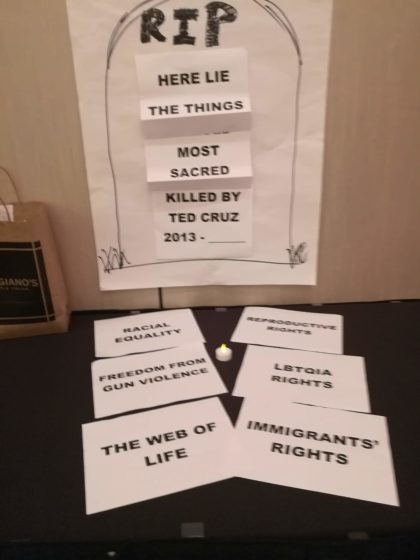
We learned many things about standing up for our UU values at the conference. Some of our speakers called this “holy disruption.” Holy disruptions work to change our perspective and the perspective of others about how the world works and what’s status quo in our lives. I know many of you already do this sort of practice. You vote!!! You march in protest. You look for and challenge microaggressions. I encourage you to talk with your kids about it too.
Our lives are so crazy busy though. We also heard a workshop on saying yes and saying no when it comes to social justice work. There is so much that needs to be done in the world. It can be overwhelming. So, pick one. Just one. Rest assured that other people are picking some of the other very important causes that you didn’t. What is the most important cause that you would like to work on this year? The middle school class recently heard from social justice leaders at RRUUC, asked questions, discussed, and then voted on the one that mattered the most to them – gun violence. How about your family? What do you have to say no to in order to be able to say yes to this cause. How can your family work on it together? Or even with other families?
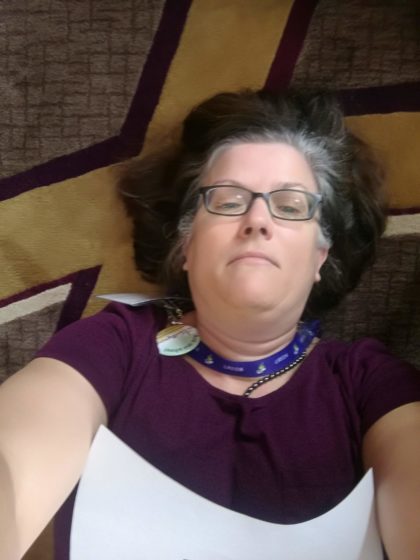
Whatever happens in this mid-term election, stay the course, choose a cause to say a “holy yes” to, look for opportunities for you and your family to create “holy disruptions.” Our world and our faith need it!
|
|
October 19, 2018 from Gabrielle
Last Sunday our Coming of Age participants stood in front of their congregation and spoke their truth about what they believe. The span was glorious….no God, reincarnation, evolution and the inevitability and embrace of change and more. Some of these children (I call them that until they are out in the world on their own though sometimes I never let the word go) were in fifth grade when I arrived, and in just a blink, there they were, contemplating and sharing with us the stuff of existence.
Blink again and….
When asked how she managed to write a Pulitzer Prize winning column, a book or two and be home with three children, Anna Quindlen, then a NYT columnist, spoke about how she worked differently, more concentrated, less chitchat. She confessed she also didn’t spend much married time with her husband. But as both were the oldest of large families, they were prepared for how much work, how much time it took to raise a family.
“Ultimately,” she said that is it well-worth what you give up; because “fifteen minutes ago [she and her husband] held their first baby who is now ten-years old, and fifteen minutes from now, he will leave for college.”
Fifteen minutes. A moment. Just a blink
As it happens, Tom Scocca wrote a beautiful, contemplative piece published just this week (take the time to read this too) that once again reminds how fast life can be, if we are lucky.
“Before the children arrived, there was not much difference from one year to the next…This is the illusion of adult timekeeping, and children make it unsustainable. Life moves along at an unexceptional, unexamined pace and suddenly it’s the first day of school, and then it’s the first day of school again. The jeans I remember just buying him are up above the ankles. The younger boy kisses me back when I kiss him good night, but by last year the older boy started to twist away from holding hands a few yards before the school door, to dart off ahead. Now he just walks to school on his own. There’s time still for him to circle back for a hug at day’s end. Someday, though, a hug will be the last one.”
He reminds us again as all great philosophers and theologians do: “All our conversations about choices and priorities and life decisions are held in the shadow of the great constraint.”
My daughter, Clare and her husband Pete, gave birth to a baby girl this past Wednesday, Charlotte Davis McGuire, far away, across the country, with me and my husband waiting by the phone all night (truth be told, I was awake, he was asleep.) She did not arrive until early morning, on the stroke of midnight…one foot in the past, and the other into the future, she strode. I love that.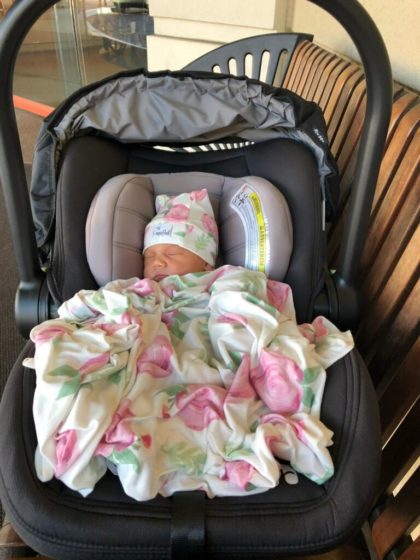
I wrote the opening reflection when my daughter was eight years old, and ended it with “My daughter will change too, she will be grown and though always my child, her face will have lines and her ever present smile more rare. It will be different, though I know not how, no do I want to. “
Today from a new grandmother’s perspective, I wish I had known.
October 11, 2018 from Beth
The gift of space. The gift of time. The gift of reflection. These are all gifts that our Coming of Age program gives our youth. Through experiences, discussion, reflection, and writing, they explore who they are in their family, in Unitarian Universalism, in their own hearts, and in the world. We tend to get caught up in the busy-ness of everyday life and rarely take the time to pause and think about the big questions of life or delve into what we hold as sacred and valuable. It is a myth that UUs can believe whatever they want. Beliefs must be well thought through and intentional. That’s what we offer all ages in religious education.
The Coming of Age ceremony this Sunday joins in a stream of Unitarian Universalist Rites of Passage. It’s their first big ceremony since child dedication. In child dedication, promises are made from parent and congregation to support the child in their UU faith formation. While faith formation is never ending, Coming of Age marks a year of intense focus on individual beliefs. In a short three years, these youth will take part in Bridging as they become a part of the adult congregation. My hope is that they will be better equipped to bring their UU values and beliefs into everything they do in the world.
Perhaps, after listening to our Coming of Age youth this Sunday, you’ll take a moment either for yourself, or better yet, for your family to think and talk about some of life’s big questions. Now more than ever, it matters what you believe.
I leave you with this poem by religious educator Sophia Lyon Fahs.
It Matters What We Believe
Some beliefs are like walled gardens. They encourage exclusiveness, and the feeling of being especially privileged.
Other beliefs are expansive and lead the way into wider and deeper sympathies.
Some beliefs are like shadows, clouding children’s days and fears of unknown calamities.
Other beliefs are like sunshine, blessing children with the warmth of happiness.
Some beliefs are divisive, separating saved from unsaved, friends from enemies.
Other beliefs are bonds in a world community, where sincere differences beautify the pattern.
Some beliefs are like blinders, shutting off the power to choose one’s own direction.
Other beliefs are like gateways opening wide vistas for exploration.
Some beliefs weaken a person’s selfhood. They blight the growth of resourcefulness.
Other beliefs nurture self-confidence and enrich the feeling of personal worth.
Some beliefs are rigid, like the body of death, impotent in a changing world.
Other beliefs are pliable, like the young sapling, ever growing with the upward thrust of life.
October 7, 2018 from Gabrielle
A ministerial colleague from Worcester was once asked what her response was to stress and lack of time. How did she manage to preach, pastor, lead and conduct rituals of passing and birth, be a mother and a wife and friend and colleague… all in five days week after week? She had often shared her commitment to meditation and the grounding it provided her…one hour plus physical exercise. I had expected her to answer with that. Instead, she told us that when there is simply too much to do and not enough time, she meditates for two hours every day plus exercise until the time crunch passes. Not only did her grounding stay in place but she found she got more done.
Last year as part of their monthly deep conversation, the Religious Education Committee went through a process of considering “what it would it look like to center families with children in the congregation?” It wasn’t a critique, indeed the congregation was founded on that very premise and many aspects of RRUUC life are inclusive of families with children…which is not always the case in all congregations.
As we conducted the provided assessment, our appreciation of RRUUC’s congregational culture grew after each “yes” we checked, but gaps were revealed and many of those gaps, are created by a larger culture that tells us time is scarce. It places significant pressure on parents to not only make choices about how they spend their time, but also their children’s. Some of this is due to the many choices that privilege of secure incomes and a rich cultural community provide. But some is also due to the fact that parents work harder and longer hours today, and when not working are commuting to and from work.
How then, we asked ourselves, do we accommodate this reality but also provide what families want if they have no time to participate? How can we be sure that what we are providing is indeed what families are looking for? No surefire assurances…try some things.
This Sunday, we begin with one of those initiatives, First Sundays, whose objective is simple — fuel a warm community. First Sundays invite parents into their children’s K-12thgrade spaces directly after worship to engage in a simple act of service together while building peer and intergenerational friendships and modeling “being a good neighbor” — two facets of family ministry.
On Sunday, we make peace and love  backpack charms for our neighbors who attend the Dream Academy – South Lake Elementary School’s after school program, an AIM partner. Parents will meet other parents and the kids that belong to them and vice versa. Coffee will be available outside the classrooms as will the cookies. Fifteen to twenty minutes a month…not exactly two hours of meditation daily….but maybe what we really need.
backpack charms for our neighbors who attend the Dream Academy – South Lake Elementary School’s after school program, an AIM partner. Parents will meet other parents and the kids that belong to them and vice versa. Coffee will be available outside the classrooms as will the cookies. Fifteen to twenty minutes a month…not exactly two hours of meditation daily….but maybe what we really need.
September 28, 2018 from Beth
Parents, you are your child’s primary religious educator and sexuality educator. Sounds daunting, right? What do you do and say in these times of a Supreme Court nominee who is accused of completely ignoring consent? How does this issue relate to Unitarian Universalism? Our first principle calls us to respect the inherent dignity of every person. That respect means asking for consent and respecting the answer. The third principle, “justice, equity, and compassion in human relations” is often taken on a large scale of justice. Yet, having compassion in our personal relationships is also part of it.
Talking to your kids isn’t a one time thing. It is finding that opportunity everywhere and expressing your values. Talking to middle and high schoolers about consent and the Kavanagh accusations makes sense. Our kids may find themselves in situations similar to the parties he attended. Our Our Whole Lives program gives them some tools. An honest, open conversation between parents and teens adds to the benefit. You are the expert on your family’s values and you know your children best.
Talking to elementary and preschool children is less obvious, but still important. Using age-appropriate situations to illustrate, it’s not too early to talk about what consent means and why it’s important. Consent is often equated with sex and sexual interactions, but it it much more. It’s giving them options. Instead of an unwanted hug from a relative, would they rather get a pat on the back or a handshake. Look for these teaching opportunities.
And, you don’t have to go it alone! You have the benefit of a loving, vibrant community that is River Road. For our youth, we offer space for them to think and talk about this very large, complicated issue. They can support each other in their UU values. Parents have other parents to bounce ideas off of and hear what’s working for other families.
And, you have your friendly religious education professionals who are always willing to chat with you, and give you excellent resources like these…
Resources
Huffington Post “How to talk to your kids about consent at any age”
NPR article “How to talk to young people about Kavanagh”
Ted Talk How to Cultivate a Culture of Consent
Statement by our UUA President Susan Frederick-Grey
September 21 2018 from Gabrielle
I try to guide or lead or be the storyteller or teach (we have so many good words) as often as I can….in that way I remain connected to part of the congregation I serve…it’s children and youth. It isn’t about what I teach them, though I certainly hope I am not wasting their time, it’s about what they teach me.
Last Sunday the Elementary children (K-5th) engaged the story of the Good Samaritan. First they watched a deft video retelling of the story made by the Mormon Church. Then each group talked about the idea of “who is my neighbor” and how are neighbors treated. The older group shared the places they see the story happening in the world now. I was not at all surprised that they are fully aware.
Nor was I surprised when I asked them, who they were in the story…the man hurt needing help, any one of the people who walked by or the Good Samaritan? They easily, perhaps more readily than adults, claimed all three. The biggest struggle was with the word neighbor, some visibly wrestling with how it may be harder to help a neighbor you know than a stranger. I admit that this is true for me too.
Other classes made food for the homeless who they identified as the man needing help, while another class designed a “better Jericho road” where people are not robbed and beaten. One of the younger elementary classes trooped down to our friendly free libraries built as part of Serving Together to refill them with food and books while considering whether these serve as Good Samaritans of a sorts.
 The group I worked with learned how to take good group portraits with iPhone cameras so as to come to know our RRUUC neighbors a bit better. Although the iPhone picture taking was the initial draw, they also enjoyed considering the people who would want their photo taken and practicing introductions and shaking hands. It was their reminder to make sure that everyone be shown the photo to approve it.
The group I worked with learned how to take good group portraits with iPhone cameras so as to come to know our RRUUC neighbors a bit better. Although the iPhone picture taking was the initial draw, they also enjoyed considering the people who would want their photo taken and practicing introductions and shaking hands. It was their reminder to make sure that everyone be shown the photo to approve it.
There was a mention of a tip jar. That didn’t fit into the story at all. And frankly I didn’t know what to do with it other than to enjoy their very high energy around it. We laughed and tussled about it — and everyone left in good spirits.
This week I work with another group and I am so looking forward to what I learn. I can’t get this anywhere else in my life. I can’t get eyes that see the world newly. I can’t even get the energy they bring. I also think, except in the most exceptional of households, that they can’t get what we did on Sunday either. Growing a soul requires all different engagements…and I am absolutely certain that what we did this past Sunday, whether in these four classes or the ones happening across the bridge, qualified.
My soul grew a bit deeper this past Sunday…and looking forward to it growing bigger still.
Sept 13, 2018 from Beth
Welcome to our new Family Ministry blog! This Sunday, Sept 16 kicks off the new RE year and it also kicks off our new Family Ministry initiative. This Sunday is the first of four family potluck brunches at 10:30. These are an opportunity to meet other families who are engaging in learning with your kids. Connections like this go a long way in supporting each other on this journey through the world of parenting.
The second of our Family Ministry programs will happen on the first Sunday of each month. We are offering either a family service or family faith development opportunity. The kids will learn about and begin each project in the classroom. Then parents will join them after worship to continue to work together.
So, why are these activities important? The Unitarian theologian, James Luther Adams proposed that all we need to navigate the problems of life and the world are “Five Smooth Stones.” Roughly summarized, these are
- always learning
- being together matters
- listen deeply to each other
- do good works
- remain hopeful
By being together and listening to each other at potluck gatherings and serving or learning together on first Sundays, we hone the relationships and skills needed to be a hopeful, positive influence for our families and our world.
We’re looking forward to seeing your families this Sunday!
For more information about Luther’s Five Smooth Stones of Liberal Religion, check out these links.
Five smooth stones as written by Rev. Naomi King
Sermon by Rev. Douglas Taylor https://douglastaylor.org/category/sermons-2011-12/
September 7, 2018, from Gabrielle
When Beth and I sent an invitation this week to all previously registered families in religious education, we claimed that RRUUC was the place where we could make better the world. It is. We also declared that RRUUC is a place dedicated to learning and practicing how to be the best person each of us can be. It is that too.
We do this in the context of multigenerational community…. every Sunday, whether in a classroom or the Sanctuary, whether we are all mixed up together, like we will be this Sunday, or whether in do this “work” in parallel play – “us here, you there.” We do it over the course of your child’s entire childhood birth to graduation. And then we invite them back after that.
Religious life provides a unique container for modeling what to choose to attend to: life and death, competition and sharing, friendship and loneliness and yes, kindness and cruelty. Where else does this happen for your child? Where else does it happen for you?
When we give birth, we are filled with a fire of commitment to remake the world. This gives way, over time, to providing opportunities where our children learn how to remake the world themselves. In these ways, we connect to eternity and a world extraordinarily larger than our small corner on Whittier and River. Somehow our child knows this, even when they resist. The multigenerational nature of congregational life illuminates it.
Coming to church or temple or mosque or one’s congregation is vital. It is also, no longer lifted up, culturally, as relevant – more often the opposite. It is a countercultural expression to commit to this endeavor we call RRUUC…to promise your child and yourself an examined life…while living it.

So bring some water this Sunday…maybe it is the water of your child’s first swim or their last race of the summer or from the lake where generations of your family have swam…bring that, pour it with all the others who will be there too, and re-commit to this counter-cultural practice called “church.”
See you on Sunday!
